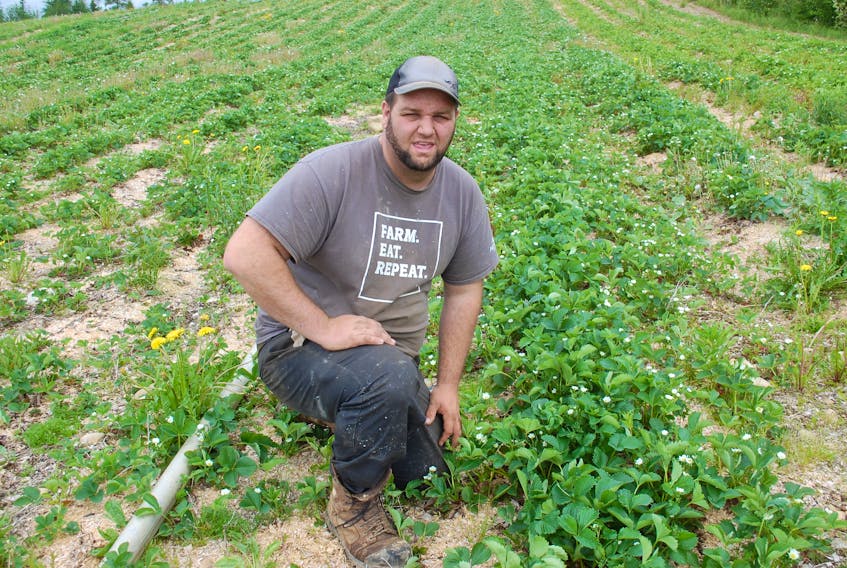CENTRAL, N.L. - After wild June weather, which saw snow on the ground in many parts of central last week, we wanted to know how the wacky weather has been affecting Newfoundland crops this growing season, and any potential tips to help produce stave off the cold.

‘Mother Nature still rules all’
CAMPBELLTON, N.L. – The chaotic and predictably unpredictable weather of Newfoundland is something Philip Thornley has learned to tackle through his 40 years of work.
Campbellton Berry Farm, Thornley’s family business known for its plentiful strawberry fields, petting zoo, apple trees and other berry blossoms, has experienced many difficult summers weather-wise.
But Thornley says the need to adapt to the changing environment, particularly in this province, is just the nature of the game as a gardener and farmer.
“With farming we’re very dependent on the environment – Mother Nature still rules all,” said Thornley. “We just got to know what those rules are and how to work within them.”
Central Newfoundland was hit with a wet and snowy spring this year, with the now infamous 30 cm of snow brought towards the end of May and the odd snowfall continuing throughout June.
The biggest detriment to Thornley’s enterprise has been the freezing temperatures that have continued well through the spring.
“Snow is not the worst thing, the worst is these hard frosts which can do so much damage,” he said. “It damages and affects sensitive blossoms like plums, cherries. Strawberries are especially sensitive to frost.
“This year I’ve seen our blackcurrants are curled and hit. I’ve never seen that before, usually blackcurrants are pretty tough.”
Thornley has lost some of his crops to frost already this year, and for a commercial operation like his, it also means a loss to his income.
The main way the farm deals with frost is irrigation, spraying and coating the whole field with water to protect it from frost.
“When you look at it in the morning there’s a whole two inch protective layer of ice,” Thornley explained. “When it melts after a few hours the blossoms underneath are okay. But irrigation only works on cool nights, if the ground temperature goes below -4 it won’t work.
“You’re making a judgement all the time of what it’s going to cost me to protect this and what I am going to gain from protecting it.”
Tough summers have been increasingly common in recent years. Thornley says it was common to have their strawberry fields open to the public by July 1 but in recent summers they usually waited until July 15. He expects they will have to do the same this year.
Still, tough summers have often also come with a bit of an easier fall season.
“Sometimes in these kinds of years we get a good fall and we can extend our season a bit and gain with a later season what we lost from the beginning of it,” Thornley said. “This is going to be one of the poorer years for strawberries I would think but we’ll see what happens.”

Mitigating the “traumatic event”
GANDER, N.L. – When it comes to crop preservation, Jason Bull is adamant about paying attention to weather patterns.
Over the last 10 years, the Eastport Organics farmer has been studying the province’s weather, observing the highs and lows, and studying global climate realities.
As a result, Bull usually waits until a “traumatic event” passes late in June, before he starts planting outside.
“We get this warm start, followed by a really cool, cold, frost event early in the summer, then we get blasted with this heat wave that comes on,” he said. “That’s very difficult for plants to adjust to.”
So he holds off on planting his more cold sensitive items outside.
“I plan for a later plant, holding things in greenhouses, and I plan on getting more greenhouses in the future to mitigate those up and downs,” said Bull.
He feels the use of greenhouse growing until summer conditions stabilize will sustain the greatest yield for his crops.
The Eastport farmer recommends the use of greenhouse tents, caterpillar tunnels or row tunnels to all growers.
One technique Bull has implemented in his greenhouses is the heating of soil through buried cables.
The style of heating cable he uses can be found in hardware stores, for de-icing roofs and gutters, and it is regulated with a separately purchased thermostat.
“The cables keep the roots from freezing, which is what you’re looking for,” he said. “When the roots freeze the plant can’t take the water up and that’s what generally kills the plant, desiccation.”

Chris Oram, Mark’s Market
GRAND FALLS-WINDSOR, N.L. - Central Newfoundland has had unusual weather to say the least, and it may be affecting local growing operations.
“It’s just cold and late getting going,” said Chris Oram, manager of Mark’s Market located near Grand Falls-Windsor. “We haven’t had any damages to any of the crops there.”
While his parents are the owners, Oram, his wife, and his mother and father run the farm together. Mark’s Market is a mixed vegetable operation that grows, as Oram describes, everything that can possibly be grown in Newfoundland.
“I know some of the other farms around in the area are a nice bit behind because of the weather,” he said. “But we managed to work through it, we were wearing snow suits and oil clothes every day, us and the workers to try and get it all in and on time.”
Oram said unseasonal weather will push back the opening of the farm’s strawberry u-pick by roughly a week.
“2011 I came back and I’ve been on the farm ever since,” he said. “This definitely has been the coldest, weirdest spring. It’s been wet too, we’ve had a lot of rain. Cold and rain, it’s hard to get your field work done too.”
Oram said if the next two months see standard summer weather, none of the regular crops will be late.
“Because it’s really just planting and starting to grow yet,” he said. “The biggest tell all will be the next two months.”
Oram said it was cold and wet the entire time crops were being planted. He said their cabbage, which was planted on June 1, saw two significant snowfalls.
“It hasn’t looked back, it’s growing right through it,” he said.
Oram was more worried about the frost than he was the snow.
“The frost will kill things,” he said. “The snow kind of provided more of a blanket for it. The cold weather never penetrated the crops the same.”
Oram said the farm is lucky to have an irrigation system that helps protect against the frost, and he said without it he’s unsure if the crops would be in such a good state.









